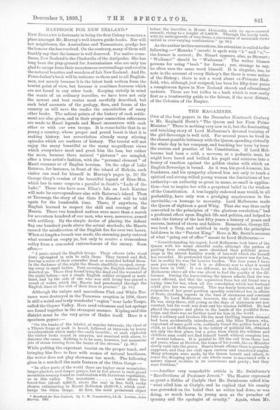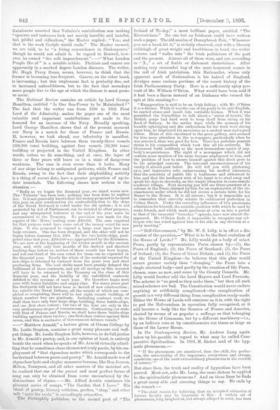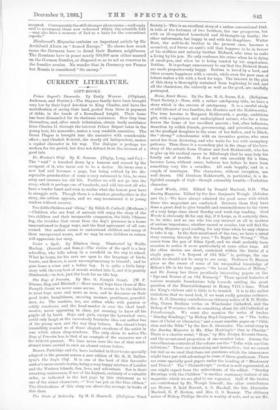THE MAGAZINES.
ONE of the best papers in the December Nineteenth Century is Mr. Reginald Brett's " The Queen and her First Prime Minister." There is nothing very new in it, but the fascinating and touching story of Lord Melbourne's devoted training of the girl-Sovereign is well told. For several years be lived in the closest possible intimacy with the Queen, spending virtually the whole day in her company, and teaching her hour by hour the custom and practice of the Constitution. If Lord Mel- bourne had been a cold, a nervous, or a pedantic man, he might have bored and bullied his pupil and mistress into a frenzy of reaction against the golden chains with which an English Sovereign is bound. As it was, his good-humour, his. frankness, and his sympathy allowed him not only to teach a spirited and strong-willed young woman the limitations of her authority—an authority so great in name, so small in applica- tion—but to inspire her with a perpetual belief in the wisdom of the Constitution. A less happily endowed man would, in all probability, have only won a grudging acquiescence in the inevitable,—a homage to necessity. Lord Melbourne made the Queen of eighteen a good Whig. That she was thus early converted to the principles of "the glorious revolution," had: a profound effect upon English life and politics, and helped to- make the history of the last fifty years a history of peace and success, instead of storm and failure. Remember, George III. was bred a Tory, and imbibed in early youth the principles laid down in the "Patriot King." Here is Mr. Brett's account of what "going out of office" meant to Lord Melbourne :— "Notwithstanding his regret, Lord Melbourne took leave of the Queen with his usual cheerful smile, although the pathos of parting from something more cherished than political power rings in the almost familiar words of farewell which she herself has recorded. He pretended that his principal sorrow was for her, but in reality his was the heavier burden. 'For four years I have seen you every day ; but it is so different now to what it would, have been in 1839: It wae different, no doubt, and it was Lord. Melbourne above all who was about to feel the quality of the dif- ference. During the leave-taking the Queen admits that she was much affected, and that the separation from her old friend was a trying time for her, when all the consolation which her husband could give her was required. This was freely bestowed, and the exigencies of her great position speedily reinvolved her in affairs of State, clouding regrets in the dust of strenuous and constant duty. To Lord Melbourne, however, the end of life had come. He was sixty-three, still young as the days of statesmen are now counted, but his work was done and his mission fulfilled. He had placed the sceptre and globe in the hands of the youthful Sove-
reign, and there was no further need for him in the world Into a solitary and loveless life the most thrilling human element had been accidentally introduced, and, like Silas Marner, who, expectant of mere gold coin, suddenly found the golden head of a child, so Lord Melbourne, in the lottery of political life, obtained not only the first place, but a prize from which the wifeless and childless man could not find himself bereft without complete loss. of mental balance. It is painful to lift the veil from those last sad years, when at Brocket, the home of his youth, the ex-Minister slowly sank into the grave. Hearts break oftener than is generally supposed, and they are cleft upon curious and unnoticed angles. Many attempts were made, by the Queen herself and others, to rouse the drooping spirit of one whose name is associated with a nature almost reckless in its insouciance and gaiety ; but they were fruitless."
Another very remarkable article is Mr. Swinburne's "Recollections of Professor Jowett." The Master expressed' so great a dislike of Carlyle that Mr. Swinburne asked him "what ailed him at Ce,rlyle, and he replied that his enmity was grounded on the belief that no writer had done, or was doing, so much harm to young men as the preacher of tyranny and the apologist of cruelty." Again, when Mr. Swinburne asserted that Voltaire's contribution was making "tyrants and torturers look not merely horrible and hateful, but pitiful and ridiculous," the Master replied : " Yes ; and that is the work Carlyle would undo," The Master seemed, we are told, to be "a living concordance to Shakespeare," though he would not admit it. In regard to Boswell, how- ever, he owned "the soft impeachment."—" What London People Die of" is a notable article. Phthisis and cancer are apparently in a marked degree London diseases. The writer, Dr. Hugh Percy Dunn, seems, however, to think that the former is becoming less frequent. Cancer, on the other hand, is increasing ; but this unpleasant fact is probably due, not to increased unhealthiness, but to the fact that nowadays more people live to the age at which the disease is most prone to occur.
The National Review contains an article by Lord George Hamilton, entitled "Is Our Sea-Power to be Maintained ? " The fact that the writer was from 1886 to 1892 First Lord of the Admiralty, makes the paper one of the most valuable and important contributions yet made to the demand for an increase of the Navy. Broadly speaking, Lord George Hamilton shows that at the present moment our Navy is a match for those of France and Russia. If, however, we look ahead, our inferiority is manifest. France and Russia have between them twenty-three vessels (210,300 tons) building, against four vessels (56,300 tons) building or projected in the United Kingdom. In other words, unless we do something, and at once, the lapse of three or four years will leave us in a state of dangerous weakness, The case is even worse than it looks. Many of our ships belong to antiquated patterns, while France and Russia, owing to the fact that their shipbuilding activity is a thing of recent date, have a greater proportion of up-to- date ironclads. The following shows how serious is the situation :— " Badly as -we began the financial year, we stand worse now. The 'Victoria' has been lost nothing has been done to replace her It is not generally known that the money proposed to be spent this year on new construction (in contradistinction to the ships of the Naval Defence) is voted under the old system ; it is not protected by Act of Parliament, can be devoted to other purposes, and any unexpended balances at the end of the year must be surrendered to the Treasury. No provision was made for the repairs of the Howe,' costing some £40,000. The sum required for that purpose must have come out of the money voted for new ships. It was proposed to expend a large sum upon two new large cruisers. One has been dropped, and the other will not be begun before January 31st, 1894. To the two battle-ships, post- poned since last year, £280,000 was appropriated by the Estimates. We are now at the beginning of the winter month in the current year, and, with only four months of the darkest and shortest working-days before us neither of those vessels has been begun, and not one-third of the sum voted for them can be expended in the financial year. Nearly the whole of the material required for new ships is obtained by contract from the great iron and steel producing firms. Ths coal strike must have greatly delayed the fulfilment of these contracts, and yet all savings on this account will have to be returned to the Treasury on the close of this financial year, and the liability of the unfulfilled contracts debited to the revenue of next year. We therefore begin next year with heavy liabilities and empty slips. For many years past the dockyards will not have been so devoid of new construction ; for, outside the Naval Defence, all the vessels of which are com- pleted or completing, there will be but eight vessels building, of which number two are gunboats. Including contract work, we shall then have only four large ships building, three battle-ships, and one first-class cruiser ; but two of the four are only in the very preliminary stages of commencement. Contrasting our state with that of France and Russia, we shall have three battle-ships building against their twelve ; one first-class cruiser against their seven, and this is exclusive of Government defence vessels."
—" Matthew Arnold," a lecture given at Owens College by Mr. Leslie Stephen, contains a great many pleasant and well- put things. Mr. Leslie Stephen fails, however, to do full justice to Mr. Arnold's poetry, and, in our opinion at least, is entirely beside the mark when bespeaks of Mr. Arnold virtually admit- ting that he sometimes chose themes not truly poetic, by his em- ployment of "that rhymeless metre which corresponds to the borderland between prose and poetry." Mr. Arnold made use of rhymeless lyric and elegiac measures because, like Ben Jonson, Milton, Tennyson, and all other masters of the metrical art, he realised that one of the purest and most perfect forms of song can only be obtained from verse uncumbered by the distractions of rhyme.---Mr. Alfred Austin continues his pleasant series of essays, "The Garden that I Love." His blend of poetry, literary criticism, garden, "shop," and other talk "mete for souls," is exceedingly attractive. The Fortnightly publishes, as the second part of "The Ireland of To-day," a most brilliant paper, entitled " The Rhetoricians." No one but an Irishman could have written such a paper. The old maxim of Donnybrook Fair, " Wherever you see a head, hit it," is strictly observed, and with a literary shillelagh of great weight and knobbiness in hand, the writer reviews and " walks into " the Irish politicians of the past and the present. Almost all of them were, and are, according to " X.," a set of feeble or dishonest rhetoricians. After making very successful hay of the most honoured names in the roll of Irish patriotism, this Nationalist, whose only apparent mark of Nationalism is his hatred of England, divulges some curious portions of the secret history of the Irish Parliamentary Party. Here is a sufficiently spicy pork trait of Mr. William O'Brien. What would have been said if it had been a Saxon instead of an Irishman who turned the spit at this roasting I)— " Exaggeration is said to be an Irish failing ; with Mr. O'Brien it is a disease. While it was the cue of his party to be anti-English, , he carried abuse and insult into veritable licence. When it was permitted the Parnellites to talk about union of hearts,' the British gorge had hard work to keep itself from rising on his flood of flattery. In the earlier days, while the memory of his humble upbringing and the enthusiasm for his work were strong upon him, he impressed his associates as a modest man and a good fellow. Hints of this circulated in the press gallery, and secured for him more attention in the newspapers, particularly when he was arrested, than was good for him. There is a guileless peasant strain in his composition which took this all too seriously. He blossomed forth suddenly as the most tremendous egoist of any- body's acquaintance. The sight of a newspaper which did not contain some mention of his name became unpleasant to him, and the problem of how to ensure himself against this shock grew to be his principal concern. The innocent unconsciousness of his vanity is almost past belief. He will tell yon with glistening eyes, and impressive sobs embarrassing his muffled utterance, that the notoriety of public life is loathsome and abhorrent to him, and that the tenderest wish of his heart is to steal away and spend his days in obscurity, as the simple librarian in some remote academic village. Next morning you will see three-quarters of a column in the Times, claimed by-him for an explanation of the cir- cumstances under which he did not secure a certain table for his dinner in the House. It is all sincere ; but it is impossible not to remember that sincerity attains its sublimated perfection in Colney Hatch. Under the corroding influences of this passionate admiration for himself, the amiable qualities with which he used to make friends, and which made partisans at even as late a period as that of the immortal " breeches " episode, have now almost dis- appeared. Mr. O'Brien finds it impossible to recognise any col- league who has voted against him or his side in any division at a party meeting."
" Self-Government," by Mr. W. S. Lilly, is in effect a dis- cussion of the question,—" What is to be the final evolution of the House of Lords P" Mr. Lilly would get a body of select Peers, partly by representative Peers chosen by,—(1), the Peers of England ; (2), the Peers of Scotland; (3), the Peers of Ireland; (4), the Peers of Great Britain ; and (5), the Peers of the United Kingdom—he believe that this plan would secure greater variety than "slumping" the Peers into a single electoral body—and partly by the creation of life Peers, chosen, some as now, and some by the County Councils. Mr. Lilly would farther add the Lord Mayors and Lord Provosts. The scheme is "as good as they make them," but then all such mixed schemes are bad. The Constitution would never endure anything so artificially complicated—the complication of growth is a very different thing from complication ready-made.
Either the House of Lords will continue as it is, with the right to put the Referendum in operation fully recognised, or it will become a body like the Senates of France and America, elected by means of as popular a suffrage as that belonging to the House of Commons, but by a different machinery—i.e., by an indirect vote or by constituencies ten times as large as those of the Lower House.
In the Contemporary Review, Mr. Andrew Lang again takes up his parable in regard to what may be called Com- parative Spiritualism. In 1884, M. Richet said of the hyp- notic phenomena :— " If the phenomena are simulated then the skill, the perfec- tion, the universality of the imposture, everywhere and always, constitute one of the most extraordinary phenomena in the records of science.'" But since then, the truth and reality of hypnotism have been proved. Must not, asks Mr. Lang, the same dictum be applied to the spiritualistic phenomena ? And on. these lines he finds a great many able and amusing things to say. He ends by the remark :— "The chief reason for believing that an accepted extension of human faculty may be imminent is this : A certain set of phenomena, long laughed at, but always alleged to exist, has been
accepted. Consequently the still stranger phenomena—uniformly said to accompany those now welcomed within the scientific fold —may also have a measure of fact as a basis for the consentient reports."
Blackwood's Magazine contains an important article by Sir Archibald Alison on "Armed Europe." He shows how much cause the Germans have to dread their Eastern neighbours. The Russians have in peace nearly 800,000 men either massed on the German frontier, or disposed so as to act as reserves to the frontier armies. No wonder that in Germany not France but Russia is considered "the enemy."








































 Previous page
Previous page